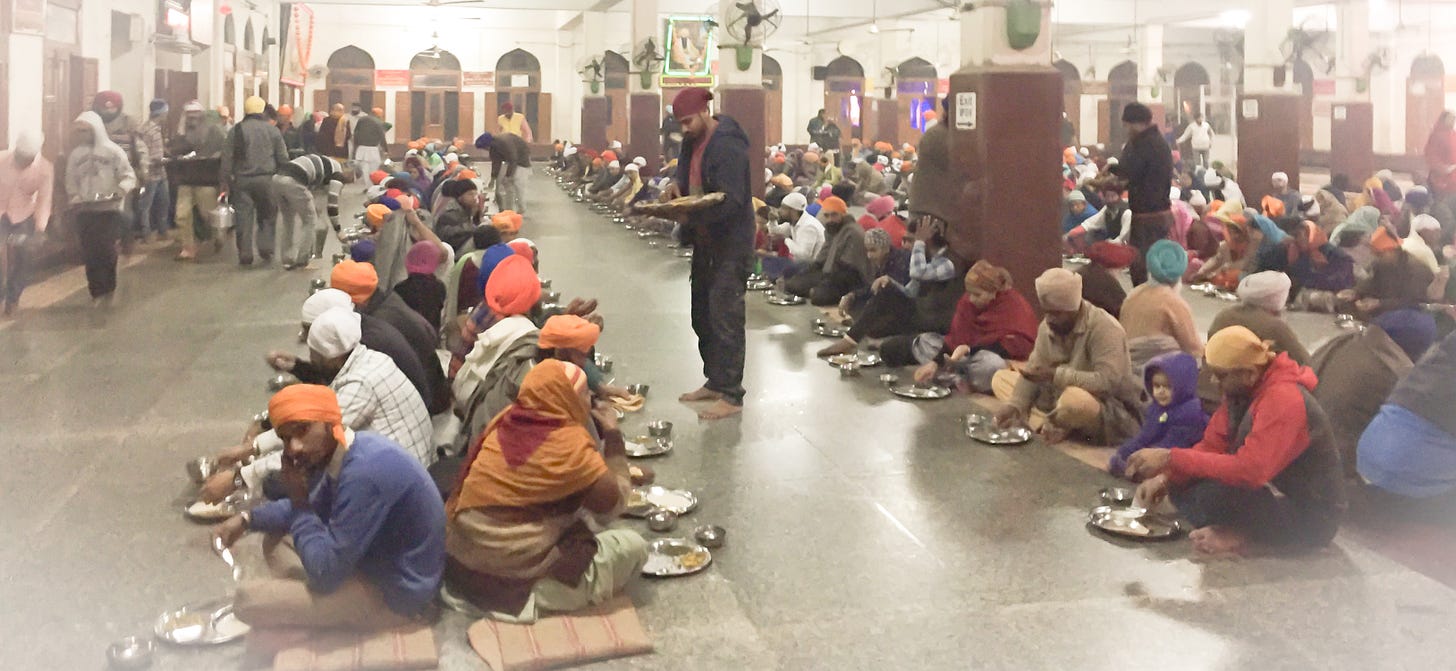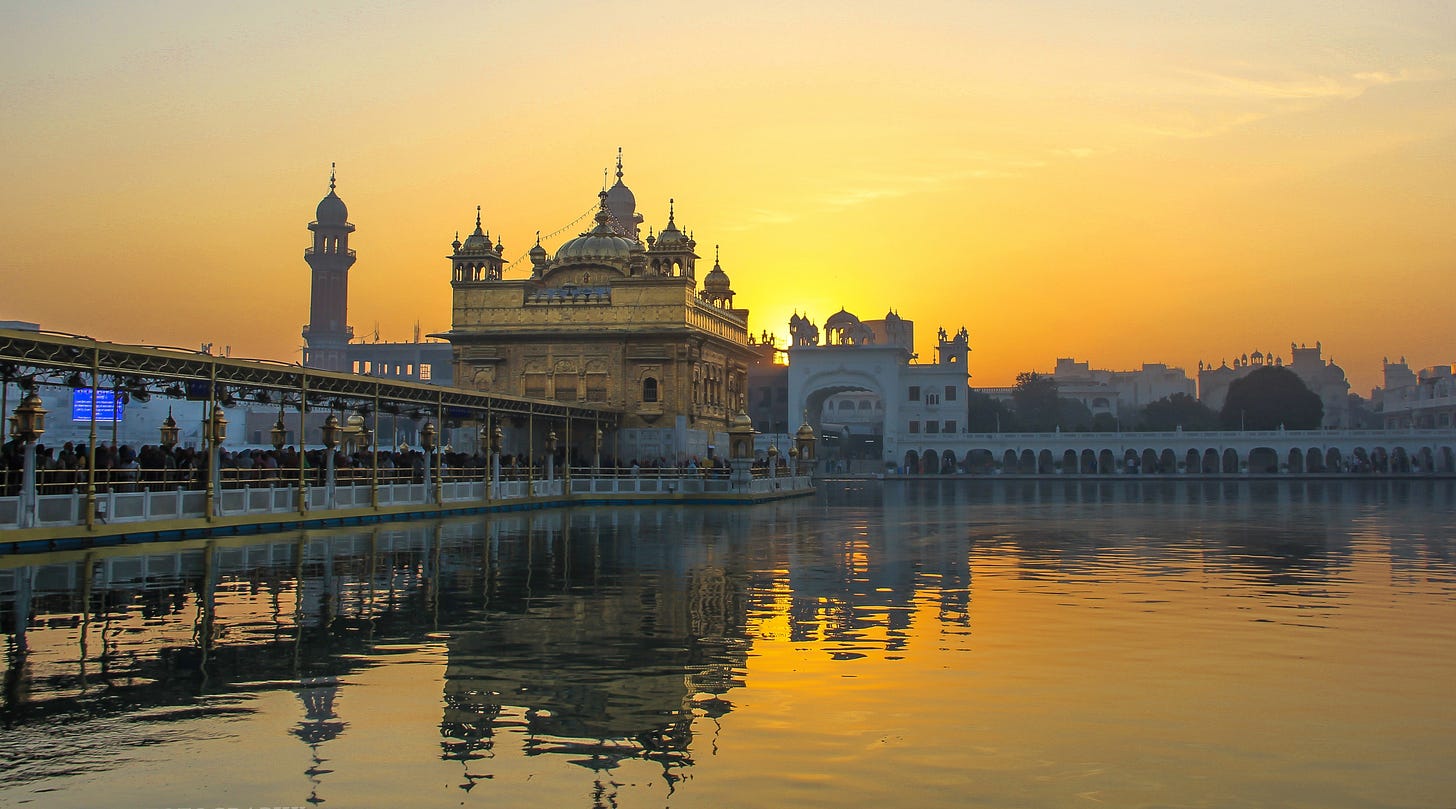Have you heard about the miracle of the feeding of 50,000?
Harmandir Sahib (Golden Temple)'s langar is the largest free meal in the world - every day.

You’ve probably heard of the “feeding of the 5,000”
Growing up in the Christian tradition, I heard and read many times about Jesus’s miracle when he took five loaves of bread and two fish and somehow used it to feed 5,000 of his followers. It’s the only miracle (aside from his resurrection) told in all four Christian gospels. In other words, it’s a story that most Christians have known since Christianity began.
When I was in college, I heard a new (to me) take on this story: that instead of a supernatural multiplication of bread and fish, what actually happened was that Jesus had faith in the crowd’s generosity. While his closest disciples worried that there was no way there would be enough food to go around, Jesus knew that if he as the leader modeled sharing, others throughout the crowd would also give. The pastor who introduced this interpretation to me talked about Jesus’s belief in abundance rather than scarcity. If people are willing to share out of their abundance instead of fearfully guarding what they have, there is more than enough to go around.
No one really knows what happened 2000 years ago.
Was it superhero/wizard Jesus doing something that no one else had the power do? Or, was it teacher Jesus showing people the right way to live? We can’t really know.
When I was a kid, I was much more into the idea of superhero/wizard Jesus. I liked magic. I wanted to believe it was real. Even in college, when I first heard this other interpretation of the feeding of the 5,000, my initial reaction was something like, That’s not nearly as cool as food being magically multiplied.
But the longer I live, the less interested I am in fantasies. I mean, magic and superhero stories can still be entertaining to some degree if I want to escape reality for a while, but I don’t feel like they have much practical use beyond that.
However, if Jesus did somehow convince a crowd of 5,000 people to spontaneously feed each other, then I would definitely like to know how he did it! Because that is no small feat.
“You will do greater works than me.”
In the Gospel of John (14:12), when Jesus is about to die, he tells his followers, “Whoever believes in me—or, according to some interpreters of the original Greek, whoever acts on their faith like me—will do the works that I do. And even greater works than those.”
As special as Jesus was, he believed even bigger miracles would be carried out by his followers. He knew his life would be short, but he had faith that his movement would carry on and accomplish much more than he ever could.
I’m not sure we’ve taken that idea to heart.
I think it’s questionable whether the people who call themselves Christians throughout history have really taken Jesus’s message to heart, especially when it comes to caring for one another. To be fair, there have always been pockets of radically generous and inclusive Christians, but all too often the church in its various forms has been much more interested in taking care of itself. Too many times throughout history it has been more eager to align itself with (and model itself after) the power and wealth of empires rather than embrace the generous teachings of Jesus.
But apparently the Sikhs have.
Recently, a co-worker returned from a trip to India, Nepal, and Bhutan. While there she visited a gurdwara (Sikh temple), where she said they fed 10,000-15,000 people per day for free!
Gurdwaras are not merely places for prayer. They are also community centers, each of which contains a langar, a community kitchen, which serves meals to all people free of charge, regardless of religion, caste, gender, economic status, or ethnicity. People from all walks of life sit on the floor and eat together, and the kitchen is maintained and serviced by Sikh community volunteers who are doing seva ("selfless service").
I was floored when I heard my co-worker’s story. I know how much work goes into coordinating volunteers to feed even 100 people for free. I couldn’t imagine what it would take to feed 10,000!
BUT THEN, I read that…
There is a place where 50,000-100,000 people are fed every day for free, mostly by volunteers.
In the city of Amristar, in the Punjab region of India, there is a gurdwara called Harmandir Sahib, commonly referred to as the Golden Temple. It is the preeminent holy site for Sikhism.
The langar in the Golden Temple complex feeds over 50,000 people every day, operating 24 hours a day, 7 days a week. According to one website, on certain holy days that number can climb as high as 200,000 people served a free meal in one day.1
I know next to nothing about Sikhism
I have not studied this religion, nor do I personally know anyone who practices it. Other than what I heard in my coworker’s presentation and what I read online yesterday while preparing this post, I am almost completely ignorant. So, you can take what I say about it with a grain of salt.
It’s easy to romanticize, criticize, or dismiss something you don’t know much about. And from what little I read, it’s not like the millions of people who have made up the Sikh religion over the last 500ish years are somehow different, better, or free from the faults that limit all the other people on this planet.
So, they’re not superheroes. They’re just people. But that, to me, makes what they’re doing even more special, even more miraculous.
We could do even greater than these.
In the United States, we do have ways of building generosity into our systems. For example, in a typical year, roughly 20 million children receive free lunch every weekday at school.2 Likewise, around 40 million people receive supplemental food assistance (SNAP) each year.3
Perhaps that feels less dramatic than having 50,000 people file through a single building in one day to sit down on the floor and eat a free meal together, but it is still something worth celebrating!
We could do so much more than that. We are the wealthiest, most powerful nation in the world with more sophisticated tools at our disposal than anyone in history has ever had. We have more than enough resources to easily make sure that no one in the U.S. is ever hungry, everyone receives adequate healthcare, and homelessness is a thing of the past.
Right now, we’re going the opposite direction.
Trump and his billionaire buddies like Elon Musk have taken sadistic pleasure in cutting funding for almost everyone in the United States who receives any kind of help. (Unless that assistance is in the form of tax loopholes for the largest, wealthiest corporations.) They celebrate the fact that we’ll have more hungry, sick, and unhoused people in the U.S. while they cut taxes for the ultra-rich.4
But this is just a moment.
Langar has existed for over 500 years. This practice of providing free meals at gurdwaras like the Golden Temple has been happening for twice as long as the United States has even existed. It didn’t start with 50,000 people per day. But look what can happen if you take the long view on what people are capable of.
It’s easy to make the mistake of catastrophizing, thinking that this shitty current moment is leading us into some kind of everlasting doom from which we’ll never escape. But actually, we can make change. This country has a long and messed up history full of all kinds of injustice. But it’s also got a long history of people working to overcome that and make it better. As MLK said, “The moral arc of the universe is long, but it bends toward justice.” That happens because average, everyday people are actually capable of some pretty miraculous things. It’s not magic. It’s consistent, caring work that anyone can do, that plenty of our ancestors have done; and that we now have even more reason to do ourselves.
https://www.goldentempleamritsar.org/best-places-to-visit/india/golden-temple/guru-ka-langar.php
https://usafacts.org/articles/how-many-us-children-receive-a-free-or-reduced-price-school-lunch/
https://www.pewresearch.org/short-reads/2023/07/19/what-the-data-says-about-food-stamps-in-the-u-s/
Not to mention all the ways that their deregulation and destruction of oversight will cause untold levels of environmental destruction in the years to come.





Everytime I learn of an alternate version of a magician Jesus story, the meaning of the message becomes much more powerful. Instead of everything being a stretch to believe (and the entire point being just believing), the wisdom of the message actually holds the key to something much more usable for leading a happy healthy life.
For quite a few years I have felt that the feeding of the 5000 is even more miraculous if I believe that Jesus was able to convince hungry people to share what they have with others.